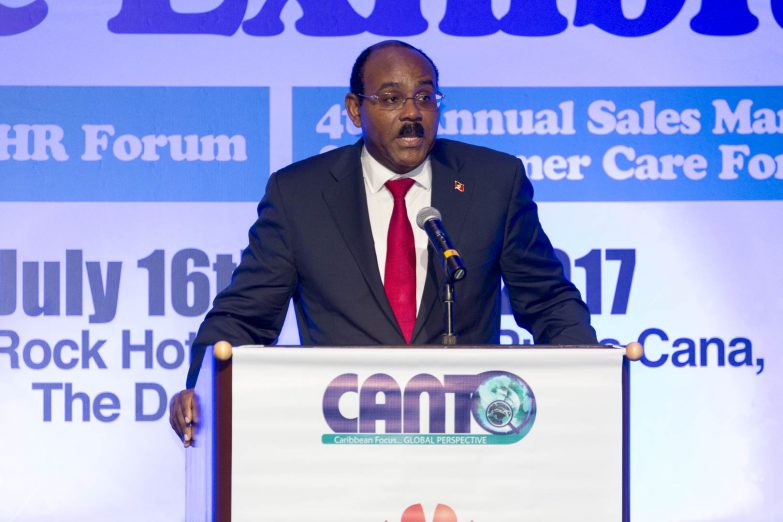CANTO Weekly Newsletter – BNamericas
Thursday, September 20, 2018
Peru congress to debate fintech bill – Regional
Telefónica rejiggers startup acceleration platform Wayra – Brazil, Regional
ICT: The week in 10 stories – Regional
MWC Americas Takeaway: LatAm gets ready for 5G – Regional
Virgin Mobile has ‘no plans’ to leave Mexico – Mexico, Regional
| Our Mission “Influence the innovation and development of ICT solutions for the benefit of members by developing, navigating and leveraging relationships with all stakeholders.” “Advocate for policies, legislation and rules which advance the creation of an environment which facilitates the deployment of services and technologies around the region.” |
| Vision “To become the leading authority in shaping information, communication and technology in the Caribbean Region and the Americas.” |
| Peru congress to debate fintech bill – Regional
A Peruvian lawmaker has submitted a bill that declares establishing fintech regulations a national priority and of national interest. In 2017, financial services industry watchdog SBS began analyzing the sector and looking at which types of fintechs should be regulated. SBS was due to present an associated report this year. Bill author Lourdes Alcorta Suerto of the Fuerza Popular party, which holds a majority in the country’s unicameral congress, says fintechs can offer “considerable benefits” but that regulations are needed to protect the interests of users. If the bill is passed, the finance ministry and SBS would be officially tasked with working on associated regulations and measures. In related news, an alliance of fintech companies was officially established in Peru this month. Known as Fintech Perú, the organization was formerly known as Apefin. The president of Fintech Perú is Oscar Salas of local P2P fintech Afluenta. Telefónica rejiggers startup acceleration platform Wayra – Brazil, Regional Spanish telecom group Telefónica reshuffled and relaunched its Wayra startup acceleration platform, according to a statement. Previously a general startup accelerator, Wayra will now focus on startups with a clear business plan and with projects better aligned to Telefónica’s own business, particularly concerning the digital transformation of the telco and its subsidiaries. Wayra will pursue projects focused on big data, AI/machine learning, cybersecurity, fintechs and blockchain, among other technologies. Telefónica has invested over 160mn euros (US$188mn) in Wayra since 2011 in 16 markets. In Brazil, Wayra has allocated 11mn reais (currently US$2.7mn) since its arrival six years ago to accelerate 68 startups. ICT: The week in 10 stories – Regional ARGENTINA Argentina launched a program to subsidize the expansion of last-mile networks and wholesale interconnection projects of micro, small and medium-sized internet service providers (ISPs). BRAZIL Brazil’s unpredictable and chaotic election is less than a month away, and all the main candidates have presented their programs. BNamericas takes a look at what the five leading contenders have planned for technology, innovation, e-gov and ICT in general. CHILE Google launched the phase two expansion of its Latin American data center in Santiago, meaning a US$140mn investment on top of the US$150mn invested in phase one during 2012-15. MEXICO Mexico’s telecoms regulator IFT completed the migration of a Mexico City pay TV channel operating on the 600MHz band to a new frequency on VHF, as it works to liberate the band for the deployment of 5G services in the near future. An IFT board member said later in the week, at the Mobile World Congress Americas, that the country could be the first one out of the 5G gates in Latin Ameirca, and that the watchdog has the authority to regulate over-the-top companies if they are a threat to traditional telecoms players. PERU Peru’s fiber backbone network project (RDNFO), operated by Azteca Comunicaciones, is not meeting expectations and a new business model is needed, according to Rafael Muente, president of telecoms regulator Osiptel. REGIONAL –As global head of innovation at Visa, Mark Jamison sees how blockchain, artificial intelligence and biometrics are shaping the present and future of the financial services industry, which makes him particularly well-suited to speak about the outlook for these technologies in Latin America. Our own Patrick Nixon sat down to talk with him. –Ride-sharing and delivery apps could be the next big disrupters in Latin America’s payments space, according to market observers at the Mobile World Congress Americas in Los Angeles. –Colombia-based delivery company Rappi has reached the elusive “unicorn” status just as smaller competitor Cornershop got snatched up by retail giant Walmart. MWC Americas Takeaway: LatAm gets ready for 5G – Regional 5G has been the main theme of the Mobile World Congress Americas held in Los Angeles this past week. The technology promises higher speeds, lower latency and a new way of consuming content and communicating. Speaking to reporters, GSMA general director Mats Granryd said that the era of 5G would be that of the platform economy, giving way to new business models like Uber and Airbnb. Operators will be able to slice networks and offer segments for different use cases, many of which do not yet exist. GSMA’s Latin America director Sebastián Cabello told reporters that with 14 new governments being voted in during 2017-18, the region has the opportunity to reset digital agendas and align policies with strategies to leverage the digital economy. CHALLENGES Mobile internet penetration varies widely between countries in the region. Argentina, Chile and Uruguay are set to see penetration levels of 60% this year, while others like Guatemala and Haiti remain below 35%, according to the GSMA’s latest Global Mobile Trends report. The report says network coverage is no longer the main access barrier. The challenge is affordable charges and developing locally relevant content. On the billion people worldwide who are still unconnected to the internet, Granryd said the issue is not lack of coverage but lack of skills in how to access the web, affordability and lack of relevant content. Granryd emphasized the need for public-private partnerships to address those three issues and to work together to meet the United Nations sustainable development goals that aim to reduce poverty, inequality and environmental degradation, and promote prosperity, peace and justice. Cabello underscored the need for regional governments to address issues including the high cost of spectrum and high taxation, which drive up the costs of services and devices for end users and discourage investments from operators. In the case of Colombia, Cabello said that a 4.7tn-peso (US$1.55bn) fine slapped on Claro and Movistar as part of an asset reversion trial, as well as asymmetrical interconnection rates imposed on dominant operator Claro, had slowed investment in the sector in recent years. In Brazil, the country has worked well to roll out IoT but taxes remain among the highest in the world. Chile, for many years held up as an example in the region, is seemingly reversing its beauty contest system which charges the minimum for spectrum in order to encourage investment and appears to be planning to opt for a model that maximizes income for state coffers. This resulted in taking away spectrum in the 3.5GHz band to be used for 5G. “There are no champions in the region. All countries are doing some things well and others not so much,” Cabello said. “What we need in the region is more carrot and less stick to encourage investments.” According to the GSMA, mobile revenue growth will dip in 2018 and 2019 but still remain around 2%, driven by rising 4G and smartphone adoption. The sector is vulnerable to political instability, inflation and currency fluctuations. Operator revenues are forecast to increase by a CAGR of 1.3% to US$82.3bn in 2025 from US$74.1bn in 2017. In 2025, 64% of connections in the region will be 4G compared to 30% in 2017. Some 8% will be 5G. Operators are investing some US$15bn per year in networks. 5G coverage in Latin America is forecast to be much lower than in the US (49%), China (28%) and Europe (29%). But this is not significant, according to Cabello. 4G will continue to co-exist with 5G for the considerable future. 5G will be a niche technology for specific use cases. What is important is to continue moving forward to narrow the digital divide, he said. Virgin Mobile has ‘no plans’ to leave Mexico – Mexico, Regional There are “no plans” for virtual mobile telecoms operator Virgin Mobile to leave Mexico’s market, despite rumors about the future of the MVNO in Latin America, a company executive told local daily El Financiero. Back in May, the company issued a statement denying a report that it was selling its regional operation for around US$300mn. But pressure has been mounting as regional operations have failed to increase their presence in certain geographies. In Mexico, the company accounts for 0.5% of the mobile voice market and 0.7% of mobile broadband, according to official data. It has left other regional markets such as Peru. In an April interview with BNamericas, the company’s Mexico CEO, Steve Logue, said that they expect to make the company cash positive in two years. “In short, no, Virgin has no plans to leave. There strategy remains the same, to develop as the digital MVNO focused on the youth segment that values and wants data in Mexico,” Virgin’s marketing director Gerardo Escobar told the newspaper. Virgin Mobile rents capacity in Telefónica’s Mexican network for offer its services and has said it may go into business with the country’s newly launched Red Compartida wholesale network once its exclusive network contract with Telefónica expires in 2019. The information presented and opinions expressed herein are those of the author and do not necessarily represent the views of CANTO and/or its members |



